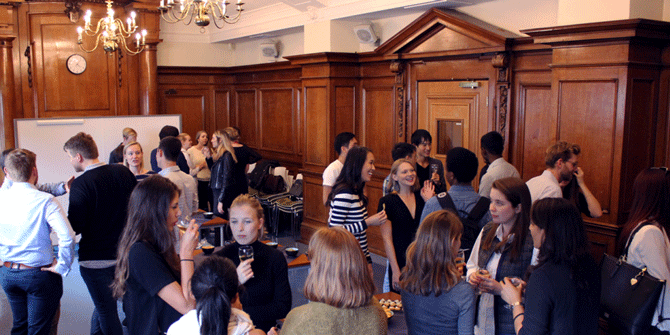
Josh Manby, who is studying a BSc Government & Economics in the Department of Government and is Editor of the LSE Undergraduate Political Review (UPR), talks about the forthcoming UPR Colloquium as well as the aims and future goals of the UPR.
The LSE Undergraduate Political Review
On Friday 4 November after months of preparation and excited nervousness, the LSE Undergraduate Political Review will be hosting its first academic conference: the UPR Colloquium. The question I am asked most, apart from what’s a “colloquium”? (it’s a small academic conference), is what is the UPR? So I’m taking this chance on the LSE Department of Government blog to explain the origins of our project, the growth leading up to our colloquium, and our plans for developing the UPR in the future.
What’s your name, where do you come from?
For those who haven’t yet come across us, the UPR is an interdisciplinary academic journal that seeks to publish the highest quality undergraduate research. We are based within the Government Department and a range of academics sit on our editorial board and peer review all our final submissions. That all sounds rather formal, but at our core we are a group of motivated and like minded students who want to bridge the gap between undergraduate and academic life, and bring undergraduate research to the attention of both established academics and policy makers. Our aim is to create a presence and a profile for undergraduate research at the highest levels possible.
None of this work happened by accident however, and underlying the project are several key goals and missions that we hope to achieve through our work (you didn’t think we published articles about the politics of Kim K’s rear for fun did you?). In pinning down our ethos, I revisited some of the applications sent in by current team members to see what they hoped to achieve with the UPR, and this re-reading led me to divvy up our mission into three identifiable goals: access, involvement, and discussion.
Access, Involvement and Discussion:
The first refers to the fact that many students at LSE feel very distant from the academic work produced by our university, despite it being one of the world’s foremost research institutions for economics and the social sciences. Students have felt that as undergraduates they have been consigned to churning through their course materials, sitting exams, and trundling off post-graduation to a big 4 firm with a 2:1 in their pocket and a few hangovers from the Students’ Union pub. But for many this wasn’t enough; they were producing high quality academic work in class and out of it, and had no mechanism to share this with the world leading academics they interacted with every day. With this in mind, our founders saw the UPR as a forum for students to be involved with the academics and the research being produced at LSE, and to have their work peer-reviewed by a specialist in their discipline. We wanted to make the undergraduate experience more active and engaging, and to bridge students with the newest research being published in their area.
The second goal of involvement refers not just to academia, but to the wider culture of politics at LSE. Throughout the year the UPR has been directly interviewing high profile political figures—Hilary Benn, Nick Clegg, and John McDonnell are some recent examples—and has been greatly involved with events organised by the Department of Government. The UPR has also been interacting with the LSE social media and blogs team to encourage students to have their say on contemporary political issues and arguments. At the UPR we think every undergraduate immersed in such a political environment can be directly involved with the academics publishing the newest research, as well as the politicians legislating in the corridors of power.
Finally, we hope to create a high-profile forum for political discussion and free debate. We encourage submissions not only from LSE students but also from other universities throughout the world; we are currently working with a submission from a student who is studying at Yale University. Recently the news of debate at Universities has been largely negative, with stimulating conversation being bogged down in partisan arguments and unnecessary controversies. We hold the view that if your research is academic and of a high enough quality, we’ll publish it. We’re completely non-partisan with editors specialised in multiple disciplines, and for us debate and intellectual discussion of research is the way forward.
Put concisely, we want students to get involved and immersed in academic research, to read widely, and to be continually debating and discussing contemporary political issues.
Conference (“Colloquium”)
The UPR has existed for over a year now and has made great strides in working with high profile political figures and publishing work on our online platform. The next step is our first academic conference, which is being held on Friday 4th November from 6:30-9:00pm at LSE Life (ground floor, LSE Library). The “Colloquium”, as well as being the product of over three months of extensive planning and organising, is really a physical manifestation of our core goals and objectives.
We have 6 students presenting their excellent academic research to a board of LSE’s top political scientists. Following these formal presentations we have included some time for some drinks and nibbles to fuel the political debate. Our students are presenting on topics as diverse as the use of video games in the political sphere to the efficacy of Prime Minister’s Questions, and our professors specialise in everything from developing democracies to the politics of central banking. Our Colloquium seeks to combine the best student researchers with the LSE’s top academics and should be an informative and greatly enjoyable evening for all involved.
What next?
Looking over the next year, the UPR has a huge number of projects and ideas lined up for students to get excited about and hopefully get involved in. We hope that the Colloquium will be a roaring success (celebrated joyously in the pub afterwards) and we hope to make it an annual event for each of the year’s best researchers. We will continue with our output of high quality research, in the form of longer research pieces and thought-provoking short blogs that can stimulate your mind in a few brief paragraphs. Additionally, we will also begin recruiting candidates to take over responsibilities at the LSE UPR for next year. So whether you are a budding researcher, a keen editor, or someone desperate to be directly involved with political discussion, the UPR hopefully has something that takes your fancy, and we hope you get involved in any way you can.
Being involved in the UPR has been a great privilege for me. I have had the opportunity to work with many fantastic students and academics, liaise with political figures in and out of the headlines every day, and to help students publish and develop their academic work to the highest standard. We hope the UPR has something to offer everyone, whether that something be musings on the colonialist implications of nude Kim Kardashian or an interrogation of the controversial art of Ai Wei Wei. We hope to hear from you soon.
Josh Manby is studying a BSc Government and Economics in the Department of Government and is also Editor of the LSE Undergraduate Political Review (UPR).
LSE UPR offers undergraduates the opportunity to publish research in a peer reviewed journal, and get involved in contemporary political debates by disseminating their work online.
Follow the LSE Undergraduate Political Review on Twitter – @lseupr






